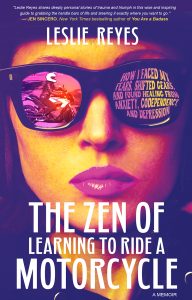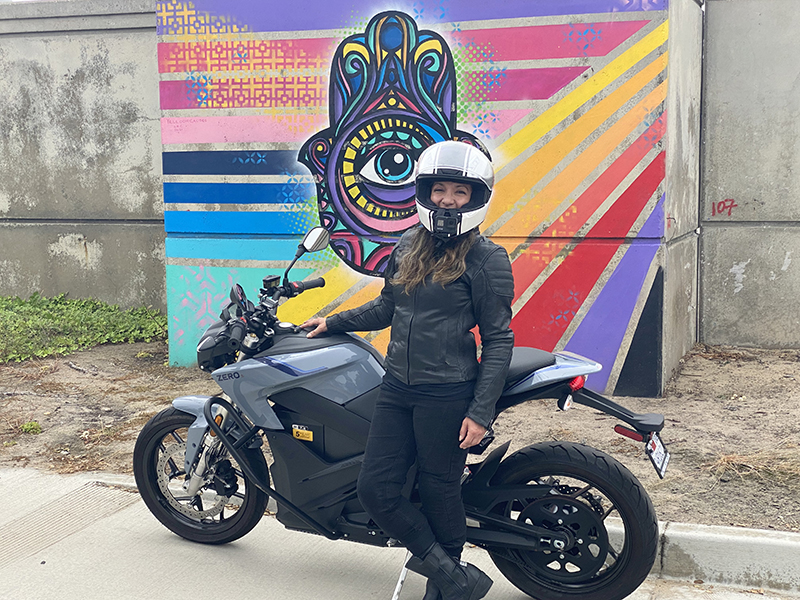The 10 Zen Principles of Good Motorcycle Riding Habits

You will dive into this book and find yourself thinking “Geez, this girl is such a mess!” The author, Leslie Reyes, even admits she is, or was. You’ll also find that you can personally relate to some or many of her experiences and self-doubts. The tale she weaves is one of a slow but determined progression into self-awareness, independence, and self-care guided by the zen (the focus on the present) she finds as she grows into herself and into motorcycling.
Have you ever driven somewhere and don’t remember actually driving there upon arrival? That generally doesn’t happen on a motorcycle because riding requires focus. Leslie grew into herself by adapting that mindfulness to herself and her life direction.
She writes, “I wanted to adopt the habit of being mindful to help myself learn to ride a motorcycle. To focus on what I’m doing when I’m doing it, and to do things in the correct order. That’s all mindfulness is: paying attention to what you’re doing, when you’re doing it.”
Growing up in the Shadow of Mental Illness
Leslie’s tale grips me profoundly at the onset as she describes a childhood experience at the grocery store with her mother. They run into the mother of one of Leslie’s schoolmates who tries to have a conversation with Leslie’s mother. Her mother doesn’t remember her and explains she had undergone electro-shock therapy, a controversial, experimental treatment for mental disorders in the 1970s. After the encounter, Leslie’s mother tells her, “I didn’t want electro-shock therapy, but the doctors convinced your father it would help. It was supposed to make me forget all the bad things. Instead, I still remember all the bad things and I can’t remember any of the good things,” before pounding on the steering wheel and crying while little Leslie sits next to her numbly.
![2_Mom Leslie with her mother, from whom she was distanced from at a young age due to her [mother’s] mental health struggles and eventual placement in a mental care facility.](https://womenridersnow.com/wp-content/uploads/2022/08/2_Mom.jpg)
This scene sets the stage for a few years later when Leslie prevents her mother from committing suicide. She credits this experience with turning her life into “one big reaction” causing her to live with constant anxiety and fear. She grows into young adulthood distanced from her mother who eventually lives in a care facility. At that time, Leslie is inspired by a cousin who gets into dirt biking although she doesn’t see it as something she could do. She later starts looking to boys/men to provide a sense of comfort and protection only to be date-raped by one who she trusted and admired.
Tribulations of a Budding Rockstar
Living in Los Angeles, Leslie pursues the rock-n-roll lifestyle as a singer with an up-and-coming band. Still in the grips of her self-doubt and co-dependency tendencies, she gets involved with a bandmate which eventually tears the band, as well as the two of them, apart. A turning point in her career and life comes under the guidance of a voice trainer who acts as a quasi-manager and mentor, and coaches her on the importance of taking care of “number one,” first and foremost.

Living with a Different Addiction
Yet fame and riches continue to elude Leslie and she shifts focus away from a music career and into quick money making ideas that don’t pan out. After one of her most significant relationships breaks down, she realizes she is an addict—not to substances, but to romance and affection. She delves into learning about mental health and eventually psychiatric pharmaceuticals, finally finding a doctor who puts her on the correct medication path after a life of being misdiagnosed. Through this learning process, she realizes she had been going through life with an eye on her dreams and not the process of getting to them. “And when the focus is on the outcome,” she says, “you aren’t living in the present.”
As Leslie continues on with her awareness path, she applies herself to nursing school which she later completes. This triumph inspires her to an understanding. “We are capable of learning and changing our direction. New information doesn’t have to disrupt your world. If you want to, you can simply say ‘I didn’t know that before, but now that I know, I want to do better.’”
Motorcycle Therapy
Applying this philosophy to motorcycling, she understands why she was struggling so much with learning to ride in the beginning—she needed to develop skills, not reactions. She was reacting to every challenge impulsively, like grabbing too much front brake. She decides to apply transformational thinking to learning to ride instead of continuing to be afraid and reactionary.

Leslie continues to struggle as she takes the Motorcycle Safety Foundation (MSF) Basic RiderCourse, dropping her bike and not mastering the clutch as quickly as the other students. A RiderCoach suggested she move to a Zero electric bike to focus her learning on basic riding knowing she could learn the clutch afterward.
Streamlining her focus on the Zero made all the difference. She passed the class with flying colors and she rides one of her own today. The instructor credited this success to Leslie respecting her own boundaries. As they say, “Know your limits and ride within them.” As she continued her motorcycle riding education after the class, she kept a video diary of herself on YouTube as a means of keeping her from getting discouraged. The videos provide a reminder of her progress and success.
Inspiring Others
When her videos unexpectedly gained notoriety and she started interacting with followers, she started having bouts of over-confidence and not respecting where she was in the process. This would take her back to the foibles and fears of her beginning days on motorcycles. Thanks to her zen transformation, she was able to realize, “When I stop trusting myself, that’s how I know I’ve stopped being mindful. When I start to panic on the motorcycle, it’s because I’m worrying about mistakes I might make in the future, as well as thinking about riding mistakes I’ve made in the past. I want to learn from my mistakes, not relive them.”
Not dwelling on mistakes from the past, or having anxiety about the future—learning to focus on riding in the moment—that’s the motorcycling zen she is talking about. You will enjoy reading about the zen lessons she learns and applies to motorcycling through her experiences.
Leslie’s Ten Zen Principles of Good Motorcycle Riding Habits
Leslie writes, “By practicing these Ten Zen Habits, I hope that you can find a sense of healing, the way I did.”
- Respond to situations, instead of reacting.
- Understand and respect your limitations, and go at your own pace.
- Be prepared, think, and plan ahead.
- If you break something, fix it.
- If you don’t know something, learn it.
- If you fall down, get back up.
- Look in the direction you want to go, not where you don’t want to go.
- Practice mindfulness. Focus on what you’re doing and do things in the correct order.
- Practice good habits often and commit to the process.
- Enjoy the ride.
The book also includes a list of mental health resources.

